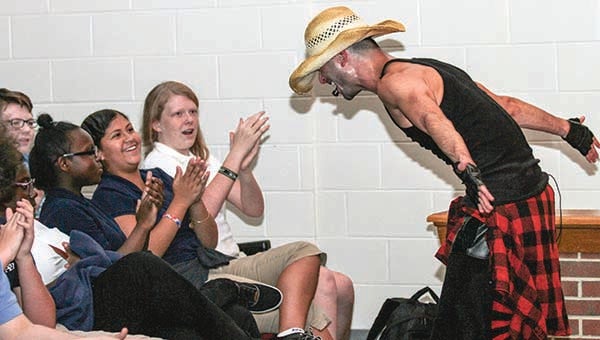Students dance along to stamp out bullying
Published 9:48 am Friday, September 19, 2014

JLINE hops off the stage and continues singing to students on the front row. From left, Zhanequa Davis, 13, Alyssa Geary, 13, and Kendall Brown, 13. — CAIN MADDEN | THE TIDEWATER NEWS
FRANKLIN—Though he’s worked on MTV and recorded his own songs, JLINE told a crowd of J.P. King Middle Schoolers on Thursday that there’s only one job where he’s willing to give it his all, working 110 percent. That’s going on tour to schools in an effort to put a stop to bullying.
It didn’t take too long for the students to get into it, as they clapped, shouted, sang along to the familiar songs and some students even stood up to dance.
“I liked his style and his dance moves, and he can really sing,” said 15-year-old Kira Keys. “His message was really inspiring.”
Keys said she was going to pass it on to others.
“People do really good things, and sometimes nobody else understands them if they are not like them,” she said. “But it’s still good, and you shouldn’t be mean to them.”
After he’d done his show, singing original songs along with covers, JLINE talked to the students about bullying. Before 6th grade, his classmates liked him for being different, but something changed when he made it to junior high.
“I told myself, ‘Alright, being myself worked out for a little while, and now it has turned against me,’” JLINE told the 8th-graders assembled. “I asked myself, ‘What’s it going to take to get people to leave me alone?’”
People didn’t have to be his friend or even talk to him, he just wanted to not be made fun of. So he shut down, started dressing in all black and wouldn’t raise his hand to answer questions in class.
“I thought, maybe they’d leave me alone if I keep my mouth shut and didn’t speak a word,” he said.
But by 8th grade, his parents had caught on, as he had closed them out as well. They wondered why he didn’t have friends over anymore and why he didn’t speak to them.
So JLINE let them know about the bullying.
“I am sick to death in the morning about getting up and going to school,” he said. “But my parents let me know that I didn’t have to let that define me. I couldn’t let everyone else tell me what I like about myself.”
So they signed him up for a Tae kwon do class. At first, he stuck to the back and tried to not stand out. But then, some of the moves started to feel like dancing, and he liked it. He memorized the moves better than anyone else and was flying through the belts.
“People started noticing that I was doing well, and they’d come up to me for advice,” he said. “And I’d answer them. That’s about when I started opening up.”
Particularly so was when he was a senior, after he’d earned his black belt. He wanted to get on stage.
“I was scared that if people laughed at me, that I wouldn’t get over it,” he said. “But I told myself that people have laughed at me before, and I’m still here.”
JLINE wouldn’t be who he is today if he hadn’t gone through that class and got on that stage. He wouldn’t have been able to follow his dream of doing music.
“I know now why I went through that dark time,” he said. “It’s so I could emphasize with others going through this.”
Hearing about what JLINE and his two backup dancers had gone through was one of Kendall Brown’s favorite parts of the show.
“I really liked that they talked about their past and what they went through,” the 13-year-old said. “It was really inspiring. Bullying is really bad, and you shouldn’t mess with people.”
Alyssa Geary, 13, also thought it was inspiring.
“I thought it was awesome, and it sent a good message,” she said. “You shouldn’t let people just get bullied.”
Guidance Councilor Meta Stratton booked the show, and she said she was pleased with how receptive the students had been.
“I don’t see bullying as a big problem here, but programs like this can help keep it as a part of the daily conversation, or in the front of our minds,” she said. “That way, it never becomes a problem.”





